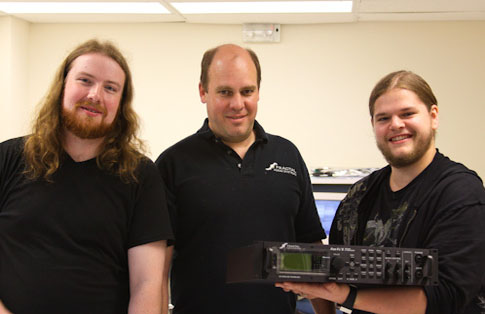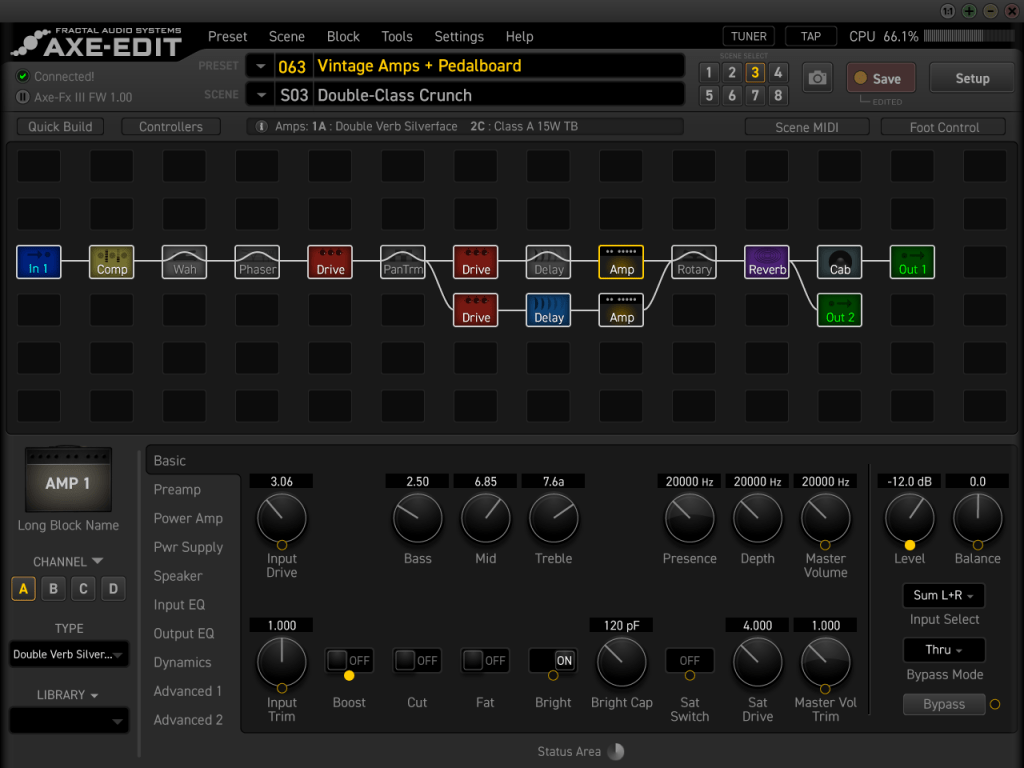In musicians circles, the Fractal Audio Systems Axe FX range of products has become one of the most highly regarded product lines. Aside from just being a neat product, what is interesting to me is the relationship they have built with their community and value they have created in the product via sustained software updates.
As a little background, the Axe FX and their other AX8/FX8 floor-board products, are hardware units that replicate in software the characteristics of an analog tube guitar amplifier and speaker cabinets. Now, for years there have been companies (e.g. Line6, IK Multimedia) trying to create a software replication of popular Marshall, Mesa Boogie, Ampeg, Peavey, Fender, and other amp tones, with the idea being that you can spend far less on the software and have a wide range of amps to choose from as well. This not only saves on physical space and dollars, but also simplifies recording these amps as you won’t need to plug in a physical microphone – you just play direct through the software. Sadly, the promise has been largely pretty disappointing. Most generally sound like fizzy, cheap knockoffs.
While this may be a little strange to grok for the non-musicians reading this, but there isn’t just a tonality assessment to determine if the amp simulator sounds like the real thing, but there is a feel element. Tube amps feel different to play. They have tonal characteristics that adjust as you dial in different settings, and one of the tricky elements for amp simulators to solve is that analog tubes adjust as you use them; the tone adjusts in subtle ways depending on what you play, how you play it, which power supply you are using, how you dial in the amp, and more.
The Axe FX changed much of this. While many saw it initially as just another amp simulator, it has evolved to a point where in A/B testing it is virtually indistinguishable from the amps it is modelling tonally, and the feel is very much there too. This is why bands such as Metallica, U2, Periphery, Steve Vai, and others carry them on tour with them: they can accomplish the same tonal and feel results without the big, unreliable, and complex-to-maintain tube amps.
Sustained Software Updates
The reason why this has been such a game changer is that Cliff Chase, founder of Fractal Audio Systems, has taken a borderline obsessive approach to detail in building this amp/speaker modelling and creating a small team to deliver it.
From a technology perspective, this is interesting for a few reasons.
Firstly, Fractal have been fairly open about how their technology has evolved. They published a whitepaper on their MIMIC technology and they have been fairly open about how this modelling technology has evolved. You can see the release notes, some further technical details, and a collection of technical posts by Cliff on the forum.
What I found particularly interesting here was Fractal have consistently delivered these improvements via repeated firmware updates out to existing devices. As an example, the MIMIC technology I mentioned above was a major breakthrough in their technology and really (no pun intended) amped up the simulation quality, but it was delivered as a free firmware update to existing hardware.
Now, many organizations would have seen such a technologically important and significant product iteration software update as an opportunity to either release a new hardware product or sell a new line of firmware at a cost. Fractal didn’t do this and have stuck to their philosophy that when you buy their hardware, it is “future proofed” with firmware updates for years to come.
This is true. As an example, the Axe FX II was released in May 2011 and has received 20+ firmware updates which have significantly improved the quality of the product.
In a technology culture where companies release new-feature software updates for a limited period of time (often 2 – 3 years) and then move firmly into maintenance/security updates for a stated “product life” (often 4 – 7 years), Fractal Audio Systems are bucking this trend significantly.
Community
This regular stream of firmware updates that bring additional value, not just security/compatibility fixes, is notable for a few reasons.
Firstly, it has significantly expanded the lifespan and market impact of these devices. Musicians and producers can be a curmudgeonly bunch, and it can take a while for a product to take hold. This is particularly true in a world where “purism” of the art of creating and producing music, and the purism of the tools you use would ordinarily reject any kind of simulated equipment. The Axe FX has become a staple in touring and production rigs because of it’s constant evolution and improvements.
Secondly, from a consumer perspective, there is something so satisfying about purchasing a hardware product that consistently improves. Psychologically, we are used to software evolving (in either good or bad directions), but hardware has more of a “cast in stone” psychological impression in many of us. We buy it, it provides a function, and we don’t expect it to change much. In the case of the Fractal Audio Systems hardware, it does change, and this provides that all important goal companies focus on: customer delight.
Thirdly, and most interestingly for me, Fractal Audio Systems have fostered a phenomenally devoted, positive, and supportive community. From a community strategy perspective, they have not done anything particularly special: they have a forum, a wiki, and members of the Fractal Audio Systems team post periodically in the forum. They have the usual social media accounts and they release videos on YouTube. This devotion in the community is not from any community engagement fakery…it is from (a) a solid product, and (b) a company who they feel isn’t bullshitting them.
This latter element, the bullshit factor, is key. When I work with my clients I always emphasize the importance of authenticity in the relationship between a company and their community of users/customers. This doesn’t mean pandering to the community and the critics, it means an honest exchange of ideas and discussion in which the company and the community/users can derive equal levels of value out of the relationship.
In my observation of the Fractal Audio Systems community, they have done just this. Cliff Chase, as the supreme leader at Fractal Audio Systems is revered in the community as a mastermind, a reputation that is rightly earned. He is an active participant with the community, sharing his input both on the musical use of his products as well as the technology that has gone into them. He isn’t a CEO who is propped up on conference stages or bouncing from journalist to journalist merely talking about vision, he is knee-deep, sleeves rolled fully-up, working on improvements that then get rolled out…freely…to an excitable community of users.
This puts the community in a valuable position. They become the logical feedback loop (again, no pun intended) for how well the products and firmware updates are working, and while the community can’t participate in improving the products directly (as they don’t have access to the code or in many cases, the skills to contribute) they get to see the fruits of their feedback in these firmware updates.
This serves two important benefits. Firstly, validation is an enormous force in what we do. Everyone, no matter who you are, needs validation of their input and ideas. When the community share feedback that is then validated by Cliff and co., and then rolled out in a freely available firmware update that benefits everyone, this is a deeply satisfying experience. Secondly, in many communities there is a suspicion about providing value (such as feedback or other technical contributions) to a company if only the company benefits from this (e.g. by selling a new product encompassing that feedback). Given that Fractal Audio Systems pushes out these updates freely, it largely eradicates that issue.
In Conclusion
Everything I have outlined here could be construed as a master plan on behalf of the folks at Fractal Audio Systems. I don’t think this is the case. I don’t believe that when Cliff Chase founded the company he layed all of this out as a grand plan for how to build community and customer engagement.
This goes back to purity. My guess is that Cliff and team just wanted to build a solid product that makes their customers happy and providing this regular stream of updates was the most obvious way to do it. It wouldn’t surprise me if they themselves were surprised by how much goodwill would be generated throughout this process.
This is all paving away to the next iteration of this journey, when the Axe FX III was announced last week. It provides significantly greater horsepower, undoubtedly to usher in the next era of improvements. This is a journey I will be following along with when I get an Axe FX III of my own in March.











